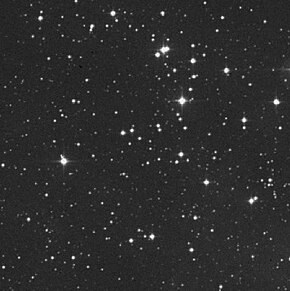Berkeley 87 is an open cluster in a heavily obscured region of the Milky Way in Cygnus.[2] The rare WO type Wolf–Rayet star WR 142 is a member of Berkeley 87.[3]
| Berkeley 87 | |
|---|---|
 | |
| Observation data (J2000 epoch) | |
| Right ascension | 20h 21m 43.01s[1] |
| Declination | +37° 22′ 13.8″[1] |
| Distance | ~1650 pc |
| Apparent dimensions (V) | 8 |
| Physical characteristics | |
| Other designations | Dolidze 7, OCl 161, C 2019+372, OCISM 34, MWSC 3325 |
| Associations | |
| Constellation | Cygnus |
This cluster contains HD 229059 which, as of August 2021, is the nearest known star to Earth with a bolometric luminosity greater than 1 million L☉.[citation needed]
| Star name | Effective temperature | Absolute magnitude | Bolometric magnitude | Mass (M☉) | Spectral type |
|---|---|---|---|---|---|
| WR 142 (Berkeley 87–29) | 200000 K | -3.13 | -10.1 | 28.6 | WO2 |
| HD 229059 (Berkeley 87–3) | 26300 K | -7.7 | -10.3 | 69 | B1Ia |
| Berkeley 87-25 | 35700 K | -5.6 | -9.1 | 39 | O8.5III |
| Berkeley 87-15 | 37800 K | -5 | -8.6 | 34 | B[e] |
| Berkeley 87-4 | 29500 K | -5 | -7.9 | 23 | B0.2III |
See also
editReferences
edit- ^ a b "Berkeley 87". SIMBAD. Centre de données astronomiques de Strasbourg. Retrieved 31 December 2020.
- ^ Turner, D. G.; Forbes, D. (1982). "Berkeley 87, a heavily-obscured young cluster associated with the ON2star-formation complex and containing the WO star Stephenson 3". Publications of the Astronomical Society of the Pacific. 94: 789–801. Bibcode:1982PASP...94..789T. doi:10.1086/131065. S2CID 123595477.
- ^ Sokal, Kimberly R.; Skinner, Stephen L.; Zhekov, Svetozar A.; Güdel, Manuel; Schmutz, Werner (2010). "Chandra Detects the Rare Oxygen-type Wolf-Rayet Star WR 142 and OB Stars in Berkeley 87". The Astrophysical Journal. 715 (2): 1327–1337. arXiv:1004.0462. Bibcode:2010ApJ...715.1327S. doi:10.1088/0004-637X/715/2/1327. S2CID 119232391.
- ^ Massey, P.; Degioia-Eastwood, K.; Waterhouse, E. (2001). "The Progenitor Masses of Wolf-Rayet Stars and Luminous Blue Variables Determined from Cluster Turnoffs. II. Results from 12 Galactic Clusters and OB Associations". The Astronomical Journal. 121 (2): 1050–1070. arXiv:astro-ph/0010654. Bibcode:2001AJ....121.1050M. doi:10.1086/318769. S2CID 53345173.